Are Raisins Healthy? 8 Benefits & Side Effects
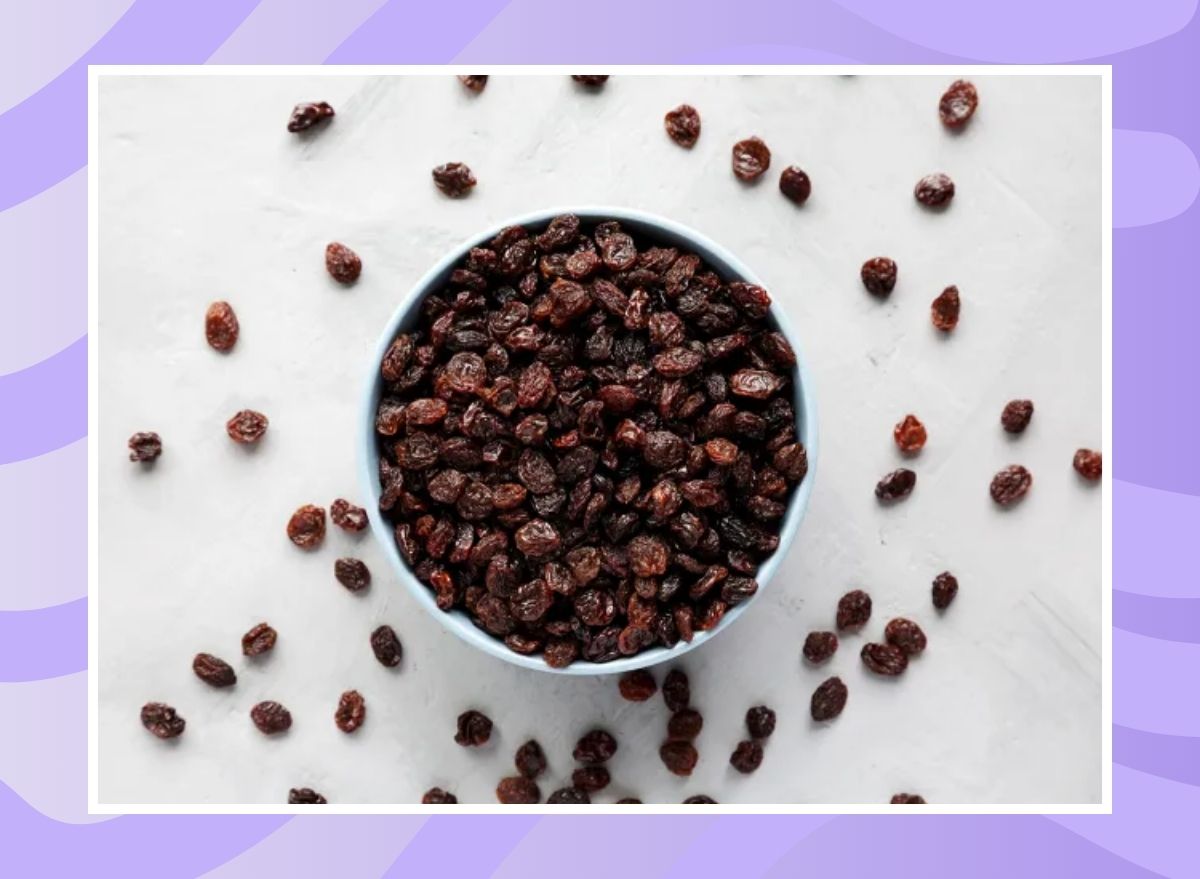
Get the inside scoop from registered dietitians on whether raisins are a friend or foe and how to incorporate them into your diet for maximum nutrition.
Americans love raisins—and it's easy to see why. According to the USDA, we consume approximately 1.3 pounds of these tiny dried grapes per person each year. Raisins are a delicious snack often found in trail mixes or baked goods. But did you know they're also a nutritional powerhouse with several health benefits? These benefits include boosting digestive health, providing a rich source of antioxidants, and improving heart health, to name a few.
Raisins are often overlooked in favor of fresh fruits, yet they provide a convenient and shelf-stable alternative that can be a healthy addition to your diet. Understanding raisins' benefits and potential side effects can help you make informed dietary choices that support your overall health. That's why we chatted with registered dietitians who explained the health benefits of raisins and revealed the potential drawbacks of these tiny yet mighty dried fruits.
Raisin Nutrition Facts
Calories: 120
Fat: 0g (Saturated fat: 0g)
Sodium: 10mg
Carbs: 32g (Fiber: 2g, Sugar: 26g)
Protein: 1g
Read on to learn about the positive and negative side effects of eating raisins, then check out Is Oat Milk Good For You? 8 Effects of Drinking It.
Raisin Benefits
They can support healthy weight gain.
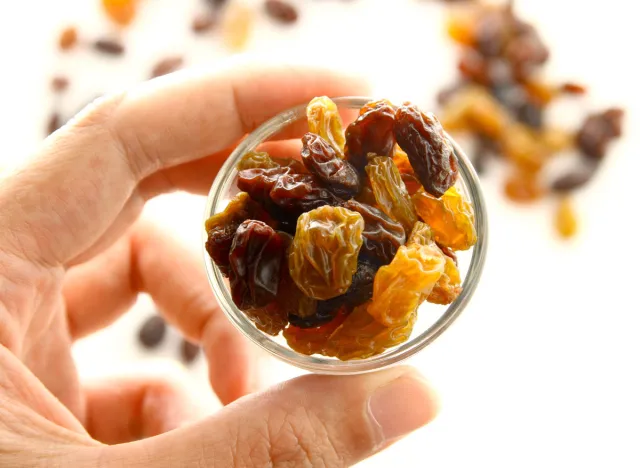
Destini Moody, RDN, CSSD, LD, a registered dietitian and sports dietitian with Garage Gym Reviews, says, "Dried fruits like raisins are what I always recommend to people trying to gain weight healthily. For those trying to put on muscle mass, eating high-calorie foods like pizza, donuts, and other meals lacking nutritional value only harms your health and your body composition."
Raisins can give you a quick energy boost.
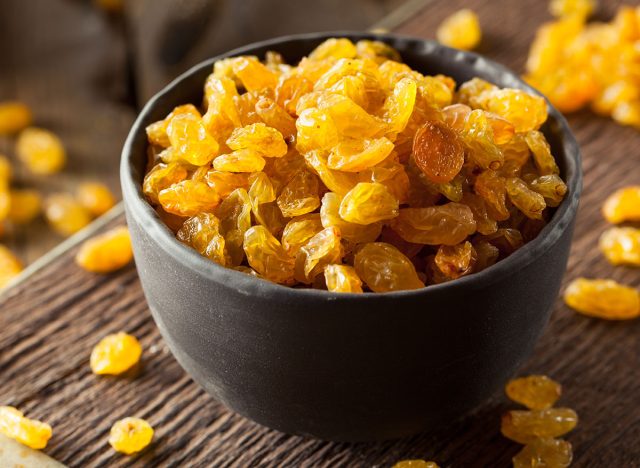
Raisins are packed with natural sugars and carbohydrates. An older 2011 study found that sun-dried raisins can be a cost-effective alternative to sports pre-workouts as a quick energy source before endurance exercise.
"Raisins are a quick-digesting carbohydrate, which makes them an excellent pre-workout source for quick energy due to their natural sugars and carbohydrates," explains Gianna Masi, CPT, RDN, a certified personal trainer and registered dietitian with Barbend. "These are recommended as a pre- or intra-workout when someone needs additional energy or carbs. Raisins are also a shelf-stable snack, meaning they won't go bad and can be packed in the car or a backpack."
They are a good source of antioxidants.
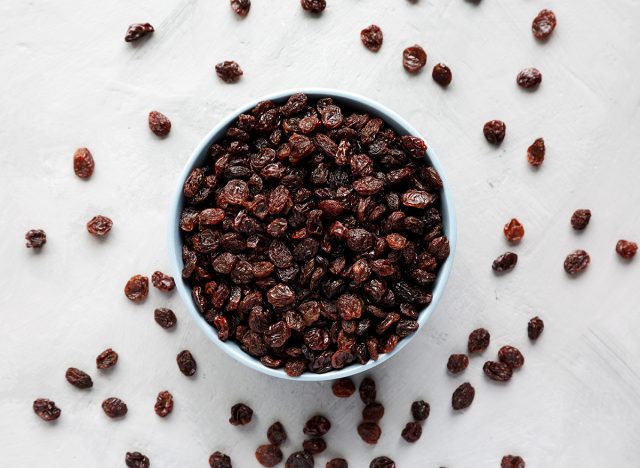
Studies show that raisins are rich in antioxidants, which help combat oxidative stress and reduce inflammation. "Grapes and raisins are a great source of phenolic antioxidants," Moody says. "Studies show these compounds help reduce the chronic inflammation that causes some cancers, diabetes, and heart disease. They may also be an antimicrobial, meaning they help the body's immune system fight off infectious diseases."
They are rich in magnesium.
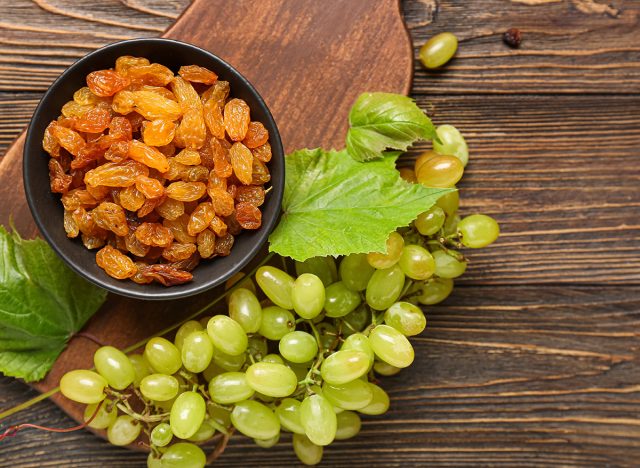
According to the Harvard T.H. Chan School of Public Health, raisins are an excellent source of magnesium, a vital mineral for various bodily functions. "Raisins are rich in magnesium, which helps with muscle function, nerve signaling, and maintaining a healthy immune system," Masi explains.
They are portable and convenient.

Raisins are a convenient, portable snack with no refrigeration and a long shelf life. "Compared to their hydrated counterparts in the form of grapes, raisins are a much more convenient health food if you're on the go," Moody notes. "They don't require refrigeration, you don't have to worry about them getting crushed in your lunch box, and they take much longer to expire or go bad. The USDA states that raisins can stay fresh for up to six months."
Raisins can regulate blood sugar.
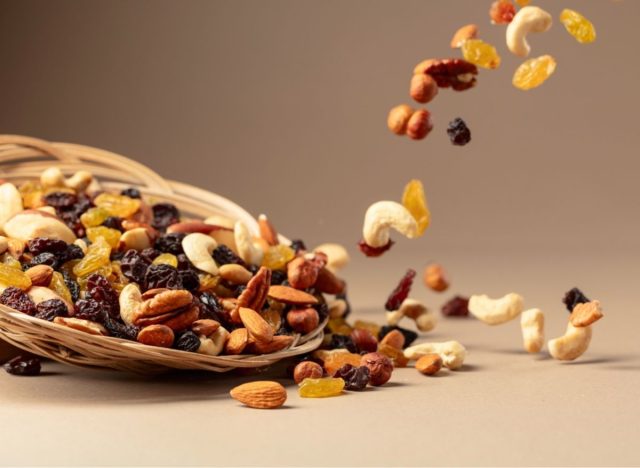
Despite their natural sugar content, research reveals that raisins have a moderate glycemic index, or GI, and can help maintain stable blood sugar levels. "The glycemic index measures how quickly a carbohydrate-containing food raises blood glucose levels," Masi explains. "Foods with a high GI are rapidly digested and cause a quick spike in blood sugar, while those with a low GI are digested more slowly, leading to a gradual rise in blood sugar. Raisins have a low to moderate GI of around 55. This GI means they cause a slower and more gradual increase in blood sugar levels compared to high-GI foods like white bread or sugary snacks."
They are high in soluble fiber.

Raisins are a good source of soluble fiber, containing 0.2 grams per 2-tablespoon serving. Soluble fiber is associated with better digestive health and regular bowel movements. Moody says, "Fiber is not only healthy for your heart, but your gut as well. Raisins contain tartaric acid, which research suggests can help balance the gut microbiome and assist with smoother digestion."
They can be used as a natural sweetener.

Raisins are an underrated natural sweetener and a much healthier alternative to refined sugars in many snacks and dishes. If you're looking for healthier alternatives to refined sugars, "Try adding raisins to trail mix, oatmeal, bread, muffins, and salads to add more sweetness to a dish and make the food more enjoyable and satisfying without the refined sugars," Masi suggests.
Potential Drawbacks
Raisins are calorie dense.

Raisins are calorie-dense (120 calories per 1/4 cup serving), which can lead to weight gain if you eat too many. "Though raisins are a healthy food, they're still a calorie-dense dried fruit," Moody explains. "So, if you are watching your weight, you might want to go with grapes as your snack of choice."
They contain sulfites.
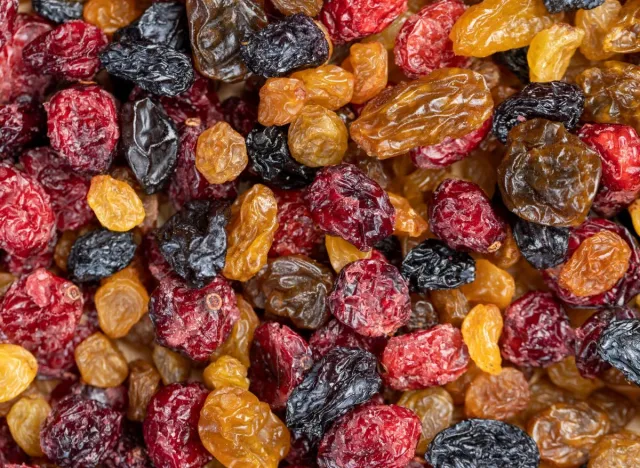
According to a 2019 study, some raisins are treated with sulfites to preserve their color and extend shelf life. This is potentially harmful since sulfites can cause adverse reactions in those with food sensitivities.
"Sulfites are a group of sulfur-based compounds commonly used as preservatives in various foods and beverages. They help prevent spoilage, discoloration, and bacterial growth," Masi points out. "This is particularly common in lighter-colored raisins, like golden raisins, where sulfites help retain their bright appearance."
They are high in sugar.
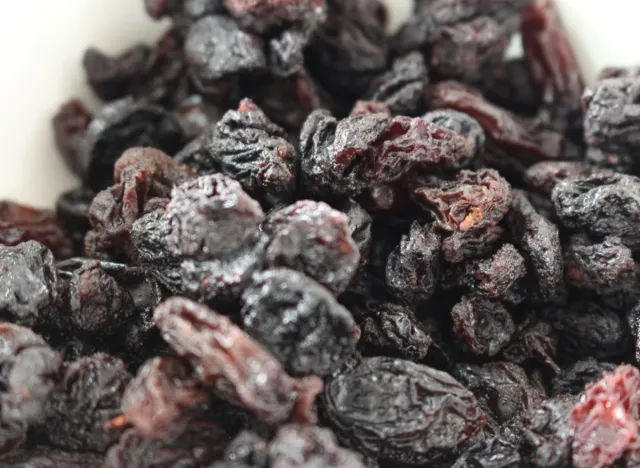
Raisins are 60% sugar. Overconsuming them may cause blood sugar spikes, so enjoy them in moderation. However, it's important to note that the sugars in raisins are natural and don't carry the same health risks as refined sugar in ultra-processed foods like candy, pastries, and soda.
"Fruits contain natural sugar and antioxidants to fight inflammation in the body, so despite popular belief, it's not a type of sugar to avoid," Moody says. "However, still watch your sugar intake, even from natural sources in some cases. For example, if you have diabetes, you'll get a blood sugar spike from eating too many raisins at once."
- Source: https://www.ams.usda.gov/sites/default/files/media/2024RaisinHearing_Exhibit29.pdf
- Source: Rietschier, H. L., Henagan, T. M., Earnest, C. P., Baker, B. L., Cortez, C. C., & Stewart, L. K. (2011). Sun-dried raisins are a cost-effective alternative to Sports Jelly Beans in prolonged cycling. Journal of strength and conditioning research, 25(11), 3150–3156. https://doi.org/10.1519/JSC.0b013e31820f5089
- Source: Olmo-Cunillera, A., Escobar-Avello, D., Pérez, A. J., Marhuenda-Muñoz, M., Lamuela-Raventós, R. M., & Vallverdú-Queralt, A. (2019). Is Eating Raisins Healthy?. Nutrients, 12(1), 54. https://doi.org/10.3390/nu12010054
- Source: https://nutritionsource.hsph.harvard.edu/magnesium/
- Source: https://ask.usda.gov/s/article/How-long-are-dried-fruits-safe#:~:text=Fruits%20such%20as%20dried%20apricots,freeze%20them%20for%20one%20month.
- Source: Esfahani, A., Lam, J., & Kendall, C. W. (2014). Acute effects of raisin consumption on glucose and insulin reponses in healthy individuals. Journal of nutritional science, 3, e1. https://doi.org/10.1017/jns.2013.33
- Source: Olmo-Cunillera, A., Escobar-Avello, D., Pérez, A. J., Marhuenda-Muñoz, M., Lamuela-Raventós, R. M., & Vallverdú-Queralt, A. (2019). Is Eating Raisins Healthy?. Nutrients, 12(1), 54. https://doi.org/10.3390/nu12010054
- Source: https://www.ncbi.nlm.nih.gov/books/NBK570127/table/lipid_diet_cardiov.T.fiber_content_of_se_2/
- Source: Guan, Z. W., Yu, E. Z., & Feng, Q. (2021). Soluble Dietary Fiber, One of the Most Important Nutrients for the Gut Microbiota. Molecules (Basel, Switzerland), 26(22), 6802. https://doi.org/10.3390/molecules26226802
- Source: Kieffer, D. A., Piccolo, B. D., Vaziri, N. D., Liu, S., Lau, W. L., Khazaeli, M., Nazertehrani, S., Moore, M. E., Marco, M. L., Martin, R. J., & Adams, S. H. (2016). Resistant starch alters gut microbiome and metabolomic profiles concurrent with amelioration of chronic kidney disease in rats. American journal of physiology. Renal physiology, 310(9), F857–F871. https://doi.org/10.1152/ajprenal.00513.2015
- Source: Miranda, G., Berna, A., & Mulet, A. (2019). Dried-Fruit Storage: An Analysis of Package Headspace Atmosphere Changes. Foods (Basel, Switzerland), 8(2), 56. https://doi.org/10.3390/foods8020056
- Source: https://asthmaandallergies.org/food-allergies/adverse-reactions-to-food-additives
- Source: Olmo-Cunillera, A., Escobar-Avello, D., Pérez, A. J., Marhuenda-Muñoz, M., Lamuela-Raventós, R. M., & Vallverdú-Queralt, A. (2019). Is Eating Raisins Healthy?. Nutrients, 12(1), 54. https://doi.org/10.3390/nu12010054









